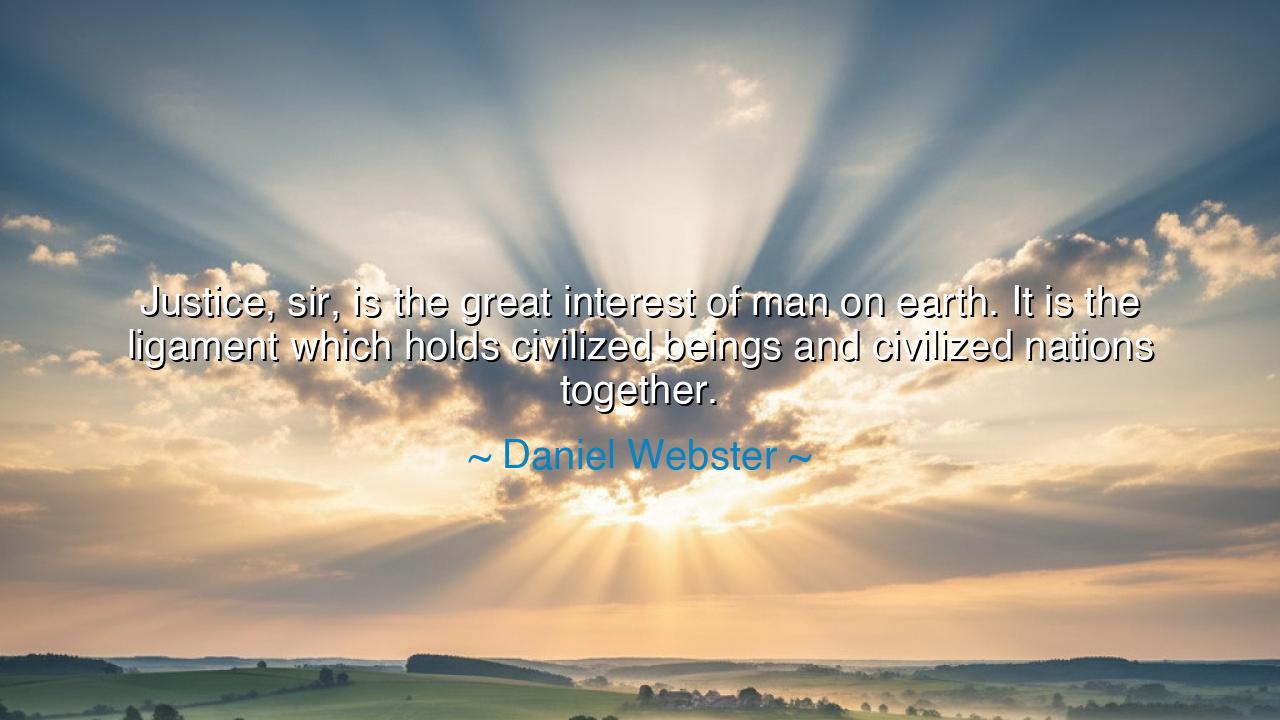
Justice, sir, is the great interest of man on earth. It is the
Justice, sir, is the great interest of man on earth. It is the ligament which holds civilized beings and civilized nations together.






The words of Daniel Webster — “Justice, sir, is the great interest of man on earth. It is the ligament which holds civilized beings and civilized nations together.” — are thunderous, solemn, and eternal. Spoken in the halls of law and power, they remind us that justice is not a luxury, nor an ornament of society, but its very foundation. Without it, civilization crumbles into chaos, and nations dissolve into tyranny or anarchy.
The meaning is clear and mighty: justice is the binding force, the ligament that holds together the bones of human community. Just as the human body cannot stand if its joints are unbound, so too can no nation endure without fairness, equity, and the rule of law. Wealth may dazzle, armies may conquer, but without justice, all achievements collapse into dust.
History bears witness. In ancient Rome, when corruption gnawed at the courts and the law became a weapon of the powerful, the Republic withered, giving way to empire and autocracy. Conversely, in the founding of the United States, Webster and his contemporaries sought to enshrine justice in the Constitution as the bedrock of liberty. Their vision was that a nation could be great only if it was fair, its citizens equal under the law, its rulers bound by the same truth as the ruled.
Webster, a lawyer and orator, spoke these words in the 19th century as America wrestled with questions of union, slavery, and governance. His declaration was not abstract philosophy, but a warning to his age: that if justice failed, the fragile bonds of the republic would snap, and civil war would follow. His prophecy was fulfilled when the nation, unable to reconcile freedom with slavery, descended into bloodshed.
Let this wisdom echo to the generations: the survival of every people depends not on conquest or commerce, but on justice. For it is the great interest of humanity — the common good that transcends wealth, power, and pride. And so, Webster’s voice thunders still: guard justice, for it alone is the ligament that binds nations, and without it, all that is built will surely fall.






AAmoxx
This quote is a sobering reminder of how essential justice is to human civilization. Yet, it also makes me reflect on the complexities of justice. How can we ensure that justice is always served when different cultures or societies might have different interpretations of what justice means? Is there a universal standard for justice, or is it something that must be adapted to each society’s values?
CTBao Cringe Tran
I love how Webster presents justice as the “ligament” that holds everything together. It’s a vivid metaphor. However, it also raises an important question—what happens when that ligament is weak or broken? Can societies continue to function if justice is not upheld or is selectively applied? I wonder, how can we strengthen justice to ensure it truly holds civilized nations together in the long run?
TVTtfderyuk Vhfdr
This quote is powerful because it reminds us that justice isn’t just a legal concept—it’s something that binds humanity together. But what does justice truly look like in today’s world, where inequality persists on so many fronts? I think we need to continually evaluate our justice systems to make sure they are inclusive and address the real issues faced by marginalized communities. Can justice truly hold societies together if it’s not applied equally?
Nnguyenhuyen
Daniel Webster’s quote beautifully emphasizes the importance of justice in maintaining the fabric of society. It makes me wonder, though, how we can ensure that justice remains fair and unbiased in the face of power imbalances. Is justice always served equally, or do those in power often manipulate it to their advantage? It seems like a constant challenge to keep justice as the cornerstone of civilization.
TKNguyen Van Tuong Khai
This quote really makes me think about how central justice is to our society. Without justice, civilization would fall apart. But it also raises the question—how do we ensure justice is applied equally for all people? If justice is the foundation of society, how can we address the systemic inequalities that still exist? Can true justice exist if it’s not universally accessible to every individual?